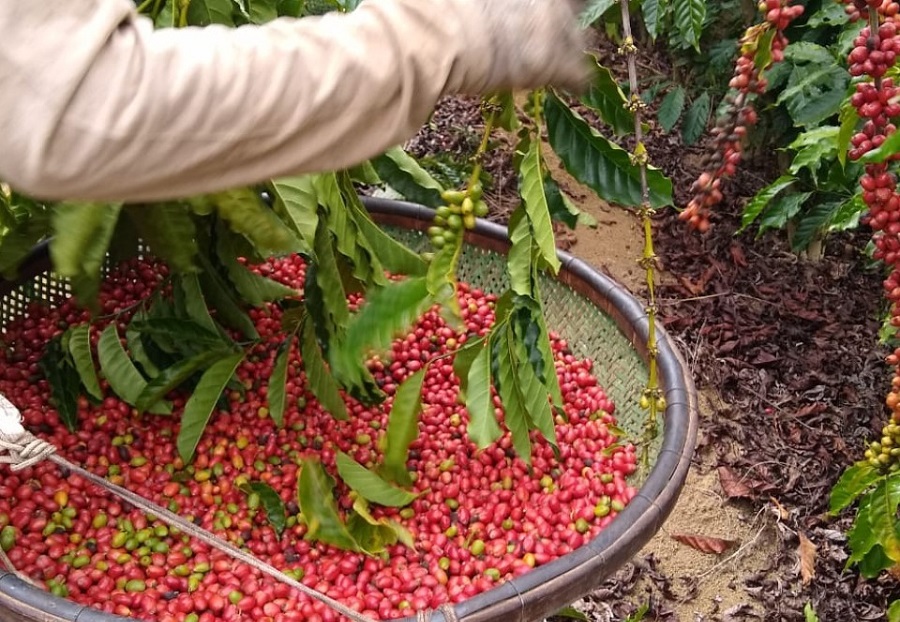RIO DE JANEIRO, BRAZIL – Canephora coffee (robusta and conilon) harvesting is starting to gather pace in Brazil, with producers expecting a larger harvest of these varieties at a time of high international prices, which reinforces a search for better quality beans in 2021, experts said.
While the national production of robusta/conilon coffee may grow up to 16% this year, according to official CONAB (National Supply Company) projections, arabica production is estimated to drop by almost 40% in the most pessimistic scenario, which has supported global prices and the commodity’s largest global producer and exporter.

So far, coffee growers in Espírito Santo and Rondônia, the country’s two largest arabica producers, have harvested about 15% of their areas, with Espírito Santo at a slower pace than last year, when yields were lower.
“The harvest is well underway, coffee growers are excited about the price, we know it fluctuates a lot, but in general there is a good outlook,” said EMBRAPA (Brazilian Agricultural Research Corporation) researcher Enrique Alves, a leading expert on Amazon robusta in Rondônia.
Conilon coffee from Espírito Santo is priced at around R$465 (US$89) per bag, up 32% compared to the same time last year, on its way to record highs in nominal terms, having last reached levels above R$500 in 2017, according to CEPEA/Esalq (Center for Advanced Studies in Applied Economics) data.
Although there is an effort to enhance their characteristics and quality, robusta and conilon beans are mostly used for the production of soluble coffee, or in “blends” of the roasting industry, because they are cheaper than arabica, which broke the R$800 a bag barrier this week, the highest nominal value in history (excluding inflation), according to CEPEA/Esalq.
“We are expecting a crop around 15% higher than last year, it would be a crop equal to 2019, this year would return to the 2019 normal…. Good crop and good prices, that helps, for sure,” said Edimilson Calegari, corporate market manager of COOABRIEL, the largest cooperative of conilon producers, with operations in Espírito Santo and Bahia.
Espírito Santo’s conilon crop may grow almost 23%, considering CONAB’s best estimate, to 11.3 million tons, bringing some relief to the market that will see a bearish year for the arabica cycle exacerbated by a prolonged drought.
Although the weather was better in the Espírito Santo area, it resulted in several blooms, which somewhat delayed the 2021 harvest, Calegari said. In 2020, about 30% of COOABRIEL’s area coffee plantations had been harvested by this time.
“This week the harvest volume began to increase, until then the coffee’s quality was a little poor, they were harvesting greener coffees, and from this week on the quality started to improve,” said the manager of COOABRIEL, noting that most producers were waiting for the complete maturation to have a better product.
“I believe that starting next week we will have a greater harvest movement. I’ve been visiting plantations and observing that maturation is more developed and it’s now possible to harvest.”
Market
According to Calegari, the cooperative is encouraging the production of better quality coffees, considering the strong external demand. He recalled that COOABRIEL’s sales have exceeded last year’s records in volumes.
“The whole world is adding robusta in their blends, and the market is in good demand after we improved the quality,” he said.
On the other hand, he commented that producers are more hesitant in sales at the moment with an eye on the market. “They are selling less coffee, selling more as needed, because they see the possibility of price improving.”
Alves, from EMBRAPA, said that in Rondônia, producers are investing in harvest and post-harvest technologies, with quality in mind. He noted that the first direct exports from Rondônia to South Korea were “successful” and there are indications of new orders for the new harvest.
“From both Korea and Europe, new buyers are interested in Amazon robustas with differentiated quality, a market that did not exist and is opening up.”
In the first quarter, exports of canephora beans from Brazil grew more than 30% year-on-year to about 900,000 60-kg bags, according to data from the Brazilian Coffee Exporters Council (CECAFÉ).

